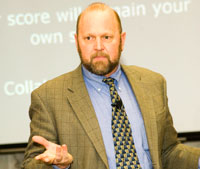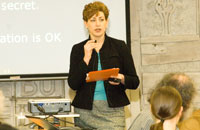Campus Update
By Greta Petry (February 15, 2007)
Roberson Leads a New CETL
 |
|
|
Bill Roberson, director of the new Institute for Teaching, Learning, and Academic Leadership, asked the faculty to question key assumptions about learning. (Photo by Mark Schmidt) |
|
The Center for Excellence in Teaching and Learning (CETL), has a new name – the Institute for Teaching, Learning, and Academic Leadership. To go with its new name, it has a new leader, Director Bill Roberson, who started his faculty workshop Feb. 2 in the Campus Center Assembly Hall by giving the professors a quiz.
A sample question: True or False: Research indicates that eating in class has a negative impact on student learning.
The answer, surprisingly, was false. Someone in the room full of professors deduced that this question and others were designed to shock the test takers out of traditional assumptions about students and how they learn.
Roberson, looking traditionally professorial with his glasses and tweed jacket with round patches at the elbows, said, "A lot of things about educational practices are myth." The question he ponders is, "What happens in the student's brain to get intellectual traction?"
Roberson was introduced by Officer in Charge and Provost Susan Herbst, who acknowledged the tremendous commitment she has found among faculty on the University at Albany campus to quality undergraduate education. Herbst said what we need now are "more powerful ways to articulate a commitment to undergraduate education and more commitment to a synergy across units." While faculty members care deeply, "many care from silos," she said.
 |
|
|
Officer in Charge and Provost Susan Herbst introduced Roberson and acknowledged the tremendous commitment to undergraduate education she has found among UAlbany faculty. (Photo by Mark Schmidt) |
|
"We need a strong teaching and learning center" to support faculty, Herbst noted, and she looks forward to the new institute's use of best practices elsewhere to make progress in teaching and curriculum development.
Noting "we are not alone in our struggle," Herbst quoted Harvard Interim President Derek Bok as likening knowledge to "a kaleidoscope" of different disciplines, and added the challenge for universities is to show students "how to pull the fragments together." Bok's successor, Catharine Drew Gilpin Faust, will take office on July 1.
Roberson then led the workshop, called Subverting the Academic Model (So Learning Can Finally Take Place). Noting that most people in the room "gravitated toward what was (academically) positive for you," he said that professors, on the whole, have been trained in the traditional academic model: "to read a lot and take a test." And they're good at it. "That's why we've got Ph.D.s," said Roberson, whose doctoral work was in the history of ideas in the 18th-20th centuries from the University of North Carolina at Chapel Hill.
 |
|
|
Roberson held faculty interest at the Feb. 2 workshop. (Photo by Mark Schmidt) |
|
He challenged the professors to question some assumptions about learning, including the idea that the professor has the key to knowledge and may be proprietary about not sharing that key with other faculty. Noting that universities were born in the church around 1200 A.D., he said the medieval professor priest was the guardian of knowledge. That model worked as long as the professor wanted all the students to think alike. But it doesn't work today. There are two forces opposing one another: the idea that knowledge is sacred, versus the concept that as new knowledge is discovered, it grows like crazy.
"I want a student who is eager to guess, who is not afraid of being wrong," he said. The problem with traditional teaching is that students wait for meaning rather than seek or construct it. "The professor's job, then, is to treat students as 'neoexperts' – to get beginners to think like professionals - and to encourage them to be motivated to persevere even through setbacks and errors," he concluded.
